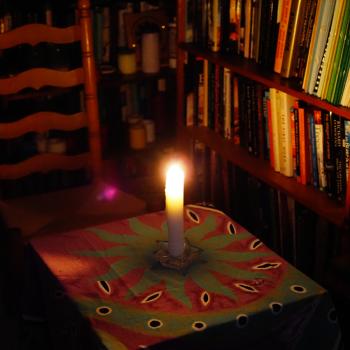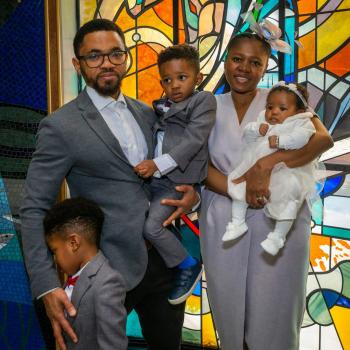Lectionary Reflections
1 Samuel 1:4-20
November 18, 2012
Is it not amazing how every huge biblical event begins in some very small way? The creation of the universe, according to the Bible, begins with the simple sound of God's voice, in complete contrast to other such ancient stories that speak of combat among titanic gods. The founding of the nation of Israel begins with an infertile couple living in a foreign land. The salvation of Israel begins with the birth of a baby boy in the context of an edict to kill all such babies. And that particular baby is saved from death by five women, one of whom is pharaoh's own daughter! And of course, most famously, the birth of Jesus occurs to an unmarried and powerless couple, unknown and unregarded in the vast empire of Rome.
And so it is at the beginning of the long story of Samuel, Saul, and David—the three major figures that dominate the early history of the nation of Israel for some one hundred years. This story begins with an Israelite family that has one husband and two wives (so much for "traditional family values," one may say). The first wife, Penninah, is marvelously fertile, bearing children to her husband year after year, while the other, Hannah, has no child. Clearly, the problem is hers, and though her name relates to the noun for "grace," she must surely have felt as devoid of grace as she felt devoid of children.
Each year this man, Elkanah (meaning "God has created"), took his family to Shiloh, a sacred shrine headed by the priest Eli and his two sons, Hophni and Phineas. When Elkanah offered his yearly sacrifice, he would give an equal portion to Penninah and to each of her many sons and daughters. As for Hannah, though the NRSV translates "he gave her a double portion, because he loved her" (1 Sam. 1:5), the text is less than clear. It could just as easily mean that Elkanah gave Hannah one portion, too, as a sort of sop to her anguish. But whatever he did, Hannah was not comforted, because her sister wife would "provoke her" year after year. One can only imagine the taunts: "Flat-bellied Hannah!" "No kid Hannah!" "Lonely loser!" Penninah probably said worse. And as a result Hannah "wept and would not eat" (1 Sam. 1:7).
Elkanah tried to comfort his wife with the following words: "Hannah, why are you crying; why aren't you eating? Why is your heart sad? Am I not more to you than ten sons?" (1 Sam. 1:8). Frankly, Elkanah, you aren't! I imagine Hannah thought that, though she did not say it. Elkanah may have imagined he was offering comfort, but his patriarchy got in the way. There is no way on earth that Hannah's husband could substitute for a child. Hannah was bereft and desperate. A woman in an ancient community that depended on large families was valued most for her ability to bear children.
So finally one year at Shiloh she had had enough of Penninah's taunts and Elkanah's would-be comfort, and she went alone to the sanctuary of YHWH. On the way in to the small, smoky, and dark building, she passed the priest Eli who was "sitting on the seat beside the doorpost of the temple of YHWH" (1 Sam. 1:9). Later, we will hear that things are not going well for Eli and hence for Israel. Indeed, the old man is going blind and the "lamp of God," the eternal flame of the presence of YHWH, "had not yet gone out," but its guttering fire is near extinction (1 Sam. 3:2-3).
It is then not surprising that Hannah passes a sitting Eli, a moribund rather than an active priestly presence. She brings her deep distress before YHWH, weeping bitterly, and praying, "O YHWH of battles, if only you will look on the misery of your servant, remember your servant, not forgetting your servant, but will give to your servant a male child, then I will set him before you as a nazirite until the day of his death. He will never drink wine or any alcoholic drink, and no razor will ever touch his head" (1 Sam. 1:11).
Hannah promises YHWH that if only a son would come forth from her barren womb, she vows that the boy will be a life-long nazirite. The word means "dedicated, consecrated, separated." In short, Hannah promises that her son would be a dedicated follower of YHWH as long as he lives. A would-be nazirite has already been presented to us in the Bible in the person of Samson. Unfortunately, according to the nazirite vow, Samson was a complete failure at the task set before him. He clearly drank a good deal, enjoying numerous parties where drink was prominent, he created many dead bodies (a part of the nazirite vow not mentioned by Hannah), and he got a very famous haircut at the shears of the wily Delilah.
As Hannah fervently prayed for her son, the sitting Eli was watching her mouth move while she prayed silently, but due to his thorough disconnection from reality, he quickly assumed that she must be drunk! This absurd conclusion makes us wonder just what sort of worshippers Eli was used to seeing in the temple of Shiloh. In addition, his conclusion is of course ironic, given the fact that Hannah has requested precisely a non-drinker from YHWH!





